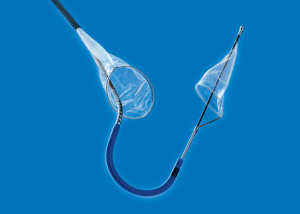by
John R. Fischer, Senior Reporter | September 01, 2017

Sentinel Cerebral Protection System
PinnacleHealth has become one of ten hospitals throughout the U.S. that now offers a system for reducing the risk of stroke during heart procedures.
The Pennsylvania-based provider is the first in the state to adopt the Sentinel Cerebral Protection System for use during transcatheter aortic valve replacement (TAVR) procedures to prevent dislodged calcium deposits from flowing to the brain and increasing the risk of stroke.
“It’s kind of our first foray in developing a technology that is going to be extraordinarily useful in this population,” Dr. Hemal Gada, medical director of the Structural Heart Program at PinnacleHealth and an interventional cardiologist, told HCB News. “With the transcatheter aortic valve procedures and other structural heart procedures that we do, there’s always the spread of particulate matter from whatever it is we’re instrumenting around, and some of that could go to the brain and cause a single stroke. It’s a minority chance, single digits. But when it happens, everyone’s devastated.”




Ad Statistics
Times Displayed: 30194
Times Visited: 744 Stay up to date with the latest training to fix, troubleshoot, and maintain your critical care devices. GE HealthCare offers multiple training formats to empower teams and expand knowledge, saving you time and money
The system is the first FDA-approved device in the U.S. for capturing and preventing debris from traveling to the brain, and has a 63 percent rate of reducing strokes during TAVR procedures and in the first 72 hours following the operation, when strokes are most likely to take place. A U.S. clinical trial found that it effectively captured deposits in 99 percent of TAVR operations and presented no additional risks to the entire procedure.
The net-shaped device is inserted through a catheter before the procedure begins and collapses around the debris. It is removed once the valve is deployed, taking the debris with it.
Gada says that in reducing the risk of stroke, the device saves on costs for longer hospital stays and necessary recovery measures for stroke victims. He says that such a device must become a standard tool.
“I think we have no choice but to standardize technology like this,” he said. “When we’re doing a procedure, any kind of preventive measure we can take, which involves the use of any safe, easy-to-deploy product and goes toward the benefit of our patients ... needs to be considered.”
Other hospitals that use the device include Cedars-Sinai in Los Angeles, Cleveland Clinic in Cleveland and NewYork-Presbyterian and Mount Sinai Heart in New York City.
The system has protected more than 3,500 patients worldwide.

